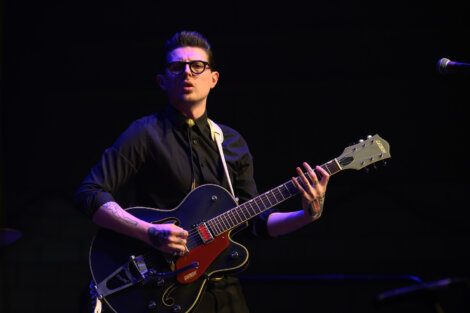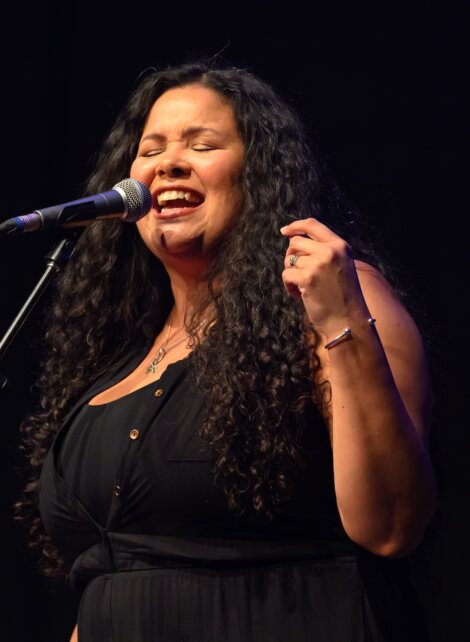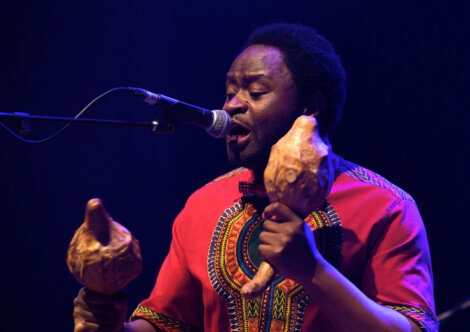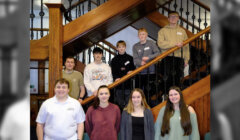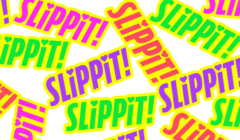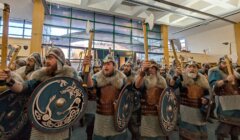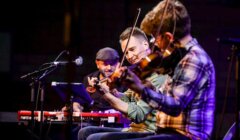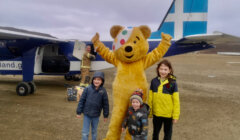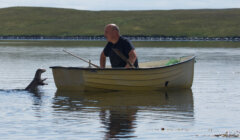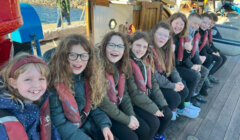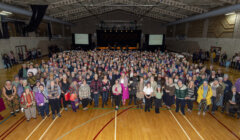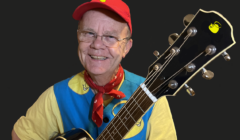Reviews / Friday Fusion: where folk music boundaries are ‘well and truly’ blown apart
It’s an age-old question. What does the term ‘folk music’ actually constitute or indeed incorporate?’ Or, alternatively, let’s turn that question on its proverbial head and ask, when does so-called ‘folk’ music’, or indeed ‘traditional music’, fall outwith the more stereotypical boundaries associated with it – or perhaps set for it – in the past, asks our reviewer Davie Gardner.
When then is folk music no longer……well…. folk music? It’s a thorny question and quite often a controversial one too.
The official line tells us that the term ‘folk music’ “used to describe all sorts of musical, oral and cultural traditions from specific regions and societies around the world”.
It goes on to suggest that the ‘folk’ element itself comes from the German word ‘volk’ meaning ‘the people’, and thus ‘folk music’ is often thought of as being the “music belonging to the people”.
Ok, but I’m still not sure that I’m any the wiser where boundaries are to be drawn in that respect then – especially if you happen to add other much-used musical terms such as ‘traditional’ or ‘roots’ to the equation.
Accepted, of course, there’s the perhaps largely undeniable aspects of all this. For us at least this can often mean the usually more Scottish, English or Irish etc orientated singer/songwriter(s) or – instrumentally speaking – just about anything with a fiddle or similar, primarily acoustic, so-called ‘traditional’ (that word again) instrument(s) featured in any line-up – or, of course, combinations of both as well.
But then how far back do you have to go to warrant, or indeed earn, the term ‘traditional’? For example, the accordion is often viewed as a traditional instrument in Shetland. However, it only became prevalent here from around the 1920’s onward I’m told. Traditional?
Become a member of Shetland News
In truth, it all becomes very confusing and at least debatable if you seek to distil it down, while it will, almost certainly, remain an entirely subjective or even contentious issue whatever.
Remember though that the original concept of the term ‘folk music’ – in its supposedly ‘true’ form in the UK at least – was originally challenged as far back as the late 1960s and 70s by bands such as Fairport Convention and Steeleye Span in England, Planxty in Ireland and the likes of Silly Wizard, and, more latterly, Shooglenifty in Scotland.
So, anyone with little more than a passing interest in this particular debate could tell by simply looking at Friday night’s Shetland FOLK Festival Clickimin Centre concert – enticingly entitled ‘Friday Fusion’ to perhaps attract the ‘non-conformist – that the boundaries mentioned above were likely to be well and truly challenged – if not completely, and perhaps somewhat bravely, blown well and truly apart.
It promised a veritable and modern melting pot of folk, roots, traditional – call it what you will – elements, set to be fused with……well just about anything that goes really. Perhaps not a night for the so-called folk purists then – but potentially a hugely eclectic, dynamic and musically exciting one, nevertheless. And so it turned out to be!!!
The gauntlet of challenge was immediately thrown down via the opening act, local rock-a-billy (for want of a better term this time around) band, the Isaac Webb trio. Their line-up featured Isaac himself on guitar and lead vocals, Gary Smith on double bass / backing vocals and Tim Matthew, drums and backing vocals – hot from recently touring the UK and Europe, and with their much-anticipated debut album due out shortly too.
Mhari McLeman from the festival committee – our compere for the night – tells us they as committee had reacted to ‘public demand’ by increasing the area of dancing space available in the hall for an occasion such as this – entirely justifiably as it ultimately turned out.
The signs were good in this respect, with dancers hitting the floor almost from the get go as the arguably by now ‘traditional’ sound(s) of ‘rock-a-billy’ – with it original ‘roots’ firmly set in the late 1950’s – immediately encouraged folk to abandon their initially much jostled for seats to ‘hit the front’ – with the bands opening track Night-sweats proving to be an entirely appropriate forecast of the evening to come – and perhaps, for many, the end result of the festival as a whole.
It was gratifying still to see that the first dancers on their feet and ‘going for it’ so to speak were all aged around ten years old or less – a good early sign of barriers being broken, inhibitions being thrown to the wind, and most certainly a positive indicator for the future provision of live music in Shetland.
Those musical ‘pigeon-holes’ mentioned earlier were further distilled down by the wonderful Kyla Brox and her band. They hail from Manchester, England, but in terms of sound, delivery and even visually to some extent, they could just as easily hail from Manchester, New Hampshire, USA – such is the wonderful and authentic (now there’s another word to play with) musical ‘soup’ they serve up, incorporating ingredients such as blues and soul with liberal sprinklings of funk and jazzy undertones to add spice to the overall mix.
Kyla’s deep, bluesy, soulful voice – which must emanate upwards from somewhere near the souls of her feet – if not the very depths of her soul itself – literally rattled the rafters and battered the breeze blocks of the cavernous Clickimin Centre, while you could almost hear the sounds of jaws dropping in amazement too. “Whit a voice,” was the general Shetland style take on what we were witnessing – and boy can she hold a note too!!!
She has her full electric band with her tonight, providing an alternative dynamic to the equally wonderful, more acoustic, performance she’d delivered in Lerwick’s ‘big kirk’ the previous evening.
Brox is a simply astounding vocalist – think a younger version of Bettye Lavette or Mavis Staples – yes that good – and for me, one of the most exciting acts I’ve seen at the folk festival for years, and, by the way, that’s saying something!
You’d hardly had time to recover before being musically, warmly and colourfully assaulted by the sounds of Harare, all the way from Zimbabwe, with their take on the traditional music and heritage (past, present and future too, apparently) of their home country.
Fronted by the lively, exuberant, and charismatic figure of Kuda Matimba (a member of Zimbabwe’s legendary Bhundu Boys) on marimba, with a backing of guitar, bass and drums, Harare unleash a delightful, highly charged, dance-inducing mix of south African musical styles and rhythms on their northern hemisphere audience.
It wasn’t long before the temperature in the hall, metaphorically speaking at least, reached levels akin to that experienced in Zimbabwe, while the audience response at the end of their set speaks (and reaches) volumes as well.
Astute programming had seen things building musically – and dancing-wise too – as the evening progressed, and the final act of the night, Valtos, did nothing to reduce that impetus whatsoever. Winners of the ‘Best Up and Coming Act’ at this year’s Trad Awards, Valtos blend their love of both traditional and electronic music to terrific effect.
Accepted, this particular approach is perhaps nothing particularly new, with artists such as Shooglenifty, Martyn Bennett and our very own Bongshang previously blazing a similar trail before them.
However, Valtos (comprising the core membership of Skye duo of Martyn MacDonald and Daniel Docherty) pretty much take this approach to a whole new level still, while maintaining traditional veins too thanks to the likes of ace fiddle player Euan McLaughlin and through employing the almost ethereal, but still clearly Scottish, vocals of Lana Pheutan.
They provide a musically brilliant, supercharged end to the evening – big beats and all – with the festival committee presumably feeling well justified in terms of having extended the room for dancing ahead of the event, given the floor is literally packed and heaving for most of the night.
If there’s one complaint tonight however it would be the stage lighting – in particular during Valtos set – with the stage itself often shrouded in virtually complete darkness for longish periods, with only searchlight style lighting to occasionally pick out or, more so, backlight / silhouette, the band members themselves. Quite possibly fine for those dancing down the front but most certainly disconcerting, frustrating and even disengaging for those simply enjoying watching from their seats. A nightmare for any official photographers too, I would imagine.
Perhaps this was what the band themselves wanted but, if so, or if this was the lighting engineers’ personal choice, this is something that might require a bit of a rethink – or perhaps I’m just getting old and fusty??!!!
Whatever. Otherwise we’d just been treated to a fantastic, continually ground-breaking and occasionally ground shaking night of music and one that can still be proud to be viewed as ‘folk music’ – if that indeed truly refers to ‘music belonging to the people’ as the old meaning tells us.
































